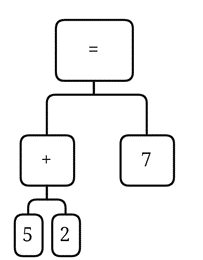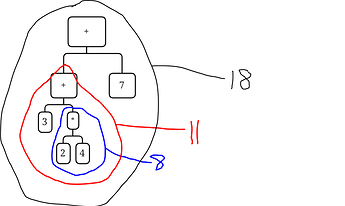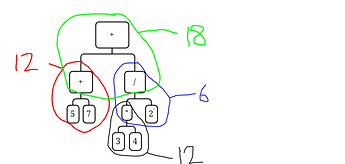It’s contextual what number would make sense as a default or fallback. When adding or subtracting, a 0 is the most neutral number, but multiplying or dividing by zero isn’t neutral at all. For those operators, a 1 is most neutral.
I didn’t think of that. So, it seems like the neutrality of those leaf nodes is related to the identity property. The identity for addition/subtraction is zero and for multiplication/division the identity is one. You would have to be careful with division and subtraction too because the order matters for the identity to hold. I’m thinking that the arithmetic trees are always meant to be read left to right as well.
You can check by going through the tree step by step to calculate the total, and also going through the math expression step by step, and comparing the steps.
A couple practice trees breaking down the calculation:
This step-by-step calculation has more of a subsuming/hierarchal form. It was still a bit hard to follow. I felt like I needed to do double checking to ensure accuracy.
I broke this one down with a bit more overlapping. The colored circles are meant to include just the minimum nodes necessary to the operation at that step. It seemed to feel a bit more intuitive.
If you want to include the total in the tree somewhere, you can use = as the root node.
Trying = as the root node:

Why?
At a conscious level, I’m convinced that using reason and learning are the path to having a really great life. I’m vulnerable to bad ideas and have a tendency to think rationalistically about philosophy, like an armchair philosopher. At the same time, I live mostly by intuition because I get paralysis by analysis. All this is to say, my thinking methods are not good and I partially recognize that is contributing to not having a great life.
I had something of the idea that knowledge could fix problems, and that that would lead to better outcomes in life, before hearing about fallibilism. I also had something of an idea about powering up in skills and accomplishing a lot once I’m really knowledgeable. I didn’t really have any plan for what to learn but I already thought that more general knowledge is better. After finding out about CF, I have become increasingly convinced that learning how to learn using philosophy is going to be the best way to power up.
Another important thing is that I enjoy learning and I like thinking/reading about philosophy. There are a variety of skills that I find it fun to get better at.
And if you don’t mind my asking, what’s your school and career situation? And, related, what are your expectations for free/available time in the coming years?
My career situation is not too good but I have a decent amount of free time. Sometimes it’s a bit intermittent but I’m never truly really busy with super important stuff. I have a college degree but I’m sort of going back to school with a couple online community college classes but they don’t take a ton of effort. I think that I will try to switch careers into something more software related in the next few years, or hopefully sooner.
As for free time that I can devote to philosophy, I think my main constraint is mental energy due to passivity and enjoying passive entertainment. With the caveat that I don’t track my schedule and plans well, I think it’s plausible that I can average 5 hours per week on philosophy. The distribution of that would probably be more like 10+ hours in 20% of weeks, 5+ hours in 50% of weeks, 2+ hours in 80% of weeks, and 1+ hours in 90% of weeks.

